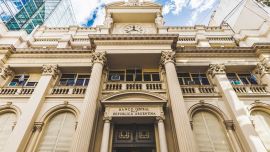As a star judge, Sergio Moro jailed scores of politicians and business leaders during Brazil’s explosive Operação Lava Jato ("Operation Car Wash") corruption probe. Now, he’s looking to upset the political order once more.
Moro had been laying low for more than a year since his resignation as justice minister amid a bitter disagreement with President Jair Bolsonaro. He returned to the public eye less than 12 months before the October 2 election, gearing up for his biggest challenge yet: A presidential run against the right-wing incumbent and leftist Luiz Inácio Lula da Silva.
It won’t be an easy task to secure a spot in an expected run-off vote as Lula and Bolsonaro each retain a substantial crowd of faithful followers. But Moro is trying to appeal to an equally large number of Brazilians who reject both leaders.
“Many people are disillusioned for lack of options,” he said during an exclusive interview at Bloomberg’s office in Brasilia, stopping short of announcing his presidential candidacy. “If people go to the supermarket and only see two products on the shelves, both products may be bad but they will have to pick one of them. We need to introduce more products.”
Moro’s presidential ambitions are putting the burden on other less competitive contenders to rethink their strategy.
The 49-year-old judge-turned-politician is one of Brazil’s best-known personalities and has emerged with nine percent of voting intention in a recent opinion poll. That already dwarfs hopefuls João Doria and Eduardo Leite, respectively the governors for São Paulo and Rio Grande do Sul, who are competing in the primaries of their Brazilian Social Democracy Party on Sunday with the goal of becoming an alternative to Bolsonaro and Lula.
Moro could further grow in the polls if he succeeds in luring early Bolsonaro backers who find themselves disillusioned with the government. Yet the president retains about 25 percent of voter intention and vast powers that allow him to boost cash handouts to the poor and increase salaries for public workers, along with other possible populist measures in the run-up to the vote.
Lula’s standing looks even more solid. After being sentenced to jail by Moro in 2018 and consequently barred from running in the previous election, the former president commands more than 45 percent of voting intention in the polls.
Moro didn’t rule out alliances with most parties during the campaign trail to try to boost his profile, not even those whose members were caught by Lava Jato in corruption scandals. The only exceptions are Lula and Bolsonaro, he said.
“There are good people and good parties at centrão,” he said, referring to a powerful group of centrist parties that tend to align themselves with whomever is in power in exchange for jobs in the administration. “We can’t make such a blanket statement.”
Broader speech
In a bid to win over a larger number of voters as well as the backing of financial markets, Moro has been expanding his traditional anti-corruption rhetoric to other key issues affecting Brazilian society, particularly inflation, poverty, and the role of state in an extremely unequal country with large social needs.
With the support of former Central Bank president Affonso Celso Pastore, most of the economic proposals he described as “Christian capitalism” are still a work in progress, he said.
But some ideas are clear for him: he is a believer in free markets, inflation is a problem that needs to be controlled with greater “fiscal credibility,” and inefficient state-owned companies should be privatised, although he didn’t name them. He also didn’t provide details of how he would fight inflation and unemployment that have both been persistently above 10 percent, while jump-starting an economy that risks stalling next year.
Asked specifically about his views on Petroleo Brasileiro SA, the state oil giant that was at the center of the corruption scandal unveiled by Carwash, Moro said he would consider the situation, including what to do about rising fuel prices.
“Petrobras has private shareholders, and an intervention in the company that will generate losses for shareholders will certainly lead to billions in lawsuits,” he said. “A study needs to be carried out to analyse whether it is viable to privatise it.”
Seeking a middle ground in the presidential race, Moro stands to suffer attacks from both the right and the left. While Bolsonaro’s supporters call him a traitor for parting ways with the president, leftist parties see him as a biased judge in the ruling that put Lula behind bars and that was subsequently annulled by the Supreme Court on procedural grounds.
The former judge, who many Brazilians see as a symbol of the fight against corruption, says he’s ready.
“I’m not a newbie. I was a judge at Lata Jato, the largest anti-corruption investigation in Brazil’s history,” he said. “If that doesn’t give me credibility and thick skin, I can’t imagine what would.”
related news
by Daniel Carvalho & Simone Preissler Iglesias, Bloomberg























Comments